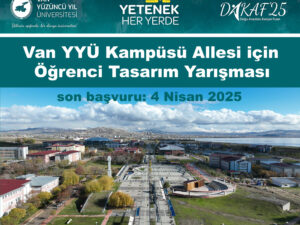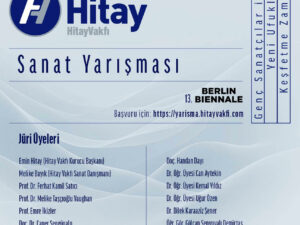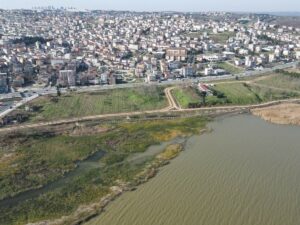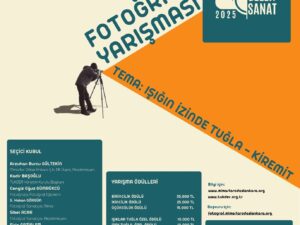- 28 Haziran 2011
- 3375 defa okundu.
Drylands Design – An Open Ideas Competition for Retrofitting the American West
An Open Ideas Competition for Retrofitting the American West'e son başvuru tarihi 15 Kasım 2011.
In anticipating, mitigating, and adapting to projected impacts of climate change, critical challenges facing the arid American West includes:
Water-Energy Nexus. It takes a lot of water to make energy and it takes a lot of energy to use water; their impact on each other is self-limiting.
Climate Change + Water Scarcity. A warmer climate leads to dwindling snowpack.
Climate Change + Variability. A warmer climate leads to intensified rain events. Infrastructural Obsolescence. Current infrastructure design favors importing increasingly scarce snowmelt over long distances for single-use, while diverting increasingly intensive local stormwater to flood-control systems as waste.Rural/Urban Disconnect. The water needs of urban growth are increasingly dependent on transfer of rights from agricultural irrigation districts.
Science/Policy Gap. There is a communication gap between people, planners, and scientists.
In securing a safe, adequate, and reliable water supply for an environmentally and economically resilient future, design has an important contribution to make.
Untying the water-energy nexus. Localized water management requires less energy.
Designing appropriate infrastructures. Flooding becomes an opportunity, not a threat.
Repairing the rural/urban continuum. Localized water management can bolster local economies in both agricultural and urban settings.
Closing the Science/Policy Gap. Design vision serves as a multidisciplinary catalyst for change.Positioning the west as leader in global drylands initiatives. New approaches lead to solutions throughout the American West and world-wide.
The California Architectural Foundation, in partnership with the Arid Lands Institute at Woodbury University and the AIACC Academy for Emerging Professionals, announces a call for entries for the 2011-2012 William Turnbull Competition: Drylands Design: An Open Ideas Competition for Retrofitting the American West. Design teams are invited to generate progressive proposals that suggest to policy makers and the public creative alternatives for the American west, ideas that may be replicated throughout the world.
Schedule
Drylands Design registration + question period will open in April 2011. Schools of Architecture—and design schools from any of the allied disciplines—are encouraged to adopt the competition as a basis for Fall 2011 studios.
April 2011
Registration Opens / Question-Answer Blog Begins
September 15, 2011
Web Briefing for Competitors
November 15, 2011
Registration Ends
December 15, 2011
Entries Due at 5 PM Pacific Standard Time
January 17, 2012
Awards Announced
March 22-24, 2012
Drylands Design Conference at Woodbury University
Awards
Architectural and Community Design awards will be considered in two categories: Student and Professional. For submission purposes, a Student is defined as an individual or team currently enrolled in a College or University. The Professional category is open to anyone who practices in their profession.
The most highly ranked submissions will receive cash prizes as outlined below. The award recipients will receive recognition as the “2011 William Turnbull Prize” winners.
Student Category
Honor Award: Architectural Proposal – $2,500
Merit Award: Architectural Proposal – $1,250
Honor Award: Community Design Proposal – $2,500
Merit Award: Community Design Proposal – $1,250
In addition, if, in the opinion of the Jury, one or more Student proposals merits a Research Grant (see below) it will be included among the five projects to receive these grants.
Professional Category
There will not be a ‘single’ award –winner. Rather, in an effort to advance a multi-pronged approach to addressing the West’s varied water needs, teams from the Professional category will be selected for research awards to be applied to further development of the proposals (see below).
Research Awards
To the five projects selected by the jury from the Professional and/or Student Category, the Arid Lands Institute at Woodbury University will award research grants of $10,000 each. Research awards will be used to advance each proposal technically, and to develop public policy tools, between January and March 2012. Award-winners will be paired with policy mentors and technical advisors from multiple disciplines. In March, award-winners will present their design research and the policy implications they suggest at ALI’s International Drylands Design Conference (March 22-24, 2012).
Publication + Exhibition
Award-winners and selected competition entries from both the professional and student categories will be exhibited in a major traveling exhibition opening at the Architecture and Design Museum in Los Angeles in spring 2012.
Award-winning entries will be published in a major Drylands Design volume that commemorates the design research + policy implications of the competition and conference. All submissions will be digitally archived in an online exhibition gallery operated and maintained by the Arid Lands Institute at aridlands.woodbury.edu.






